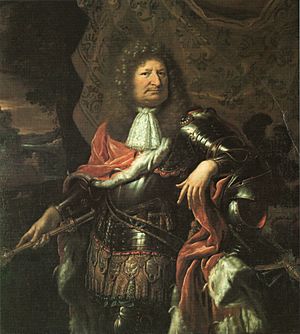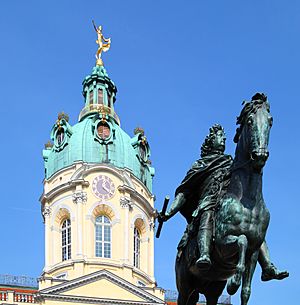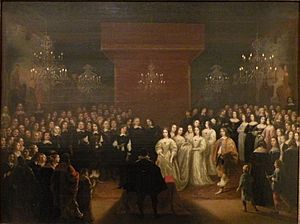Frederick William, Elector of Brandenburg facts for kids
Quick facts for kids Frederick William |
|
|---|---|

Frederick William in 1687/88, portrait by Gedeon Romandon
|
|
| Elector of Brandenburg Duke of Prussia |
|
| Reign | 1 December 1640 – 29 April 1688 |
| Predecessor | George William |
| Successor | Frederick I |
| Born | 16 February 1620 Stadtschloss, Berlin, Brandenburg-Prussia |
| Died | 29 April 1688 (aged 68) Stadtschloss, Potsdam, Brandenburg-Prussia |
| Burial | Berlin Cathedral |
| Spouse |
|
| Issue Detail |
|
| House | Hohenzollern |
| Father | George William, Elector of Brandenburg |
| Mother | Elisabeth Charlotte of the Palatinate |
| Religion | Calvinist |
| Signature | |
Frederick William (born February 16, 1620 – died April 29, 1688) was an important ruler in Europe. He was the Elector of Brandenburg and the Duke of Prussia. This meant he ruled over a combined territory called Brandenburg-Prussia from 1640 until his death in 1688.
He was a member of the House of Hohenzollern, a powerful German royal family. People often called him "the Great Elector" because of his many successes. He was a strong leader in both military and political matters. Frederick William was a dedicated follower of the Calvinist faith. He understood the importance of trade and worked hard to make his lands stronger. His smart changes at home helped Prussia become a major power in Northern-Central Europe. These changes also prepared Prussia to become a kingdom, which happened under his son and successor.
Contents
Early Life and Education
Frederick William was born in Berlin. His parents were George William, Elector of Brandenburg and Elisabeth Charlotte of the Palatinate. When he inherited his titles, his lands included Brandenburg, the Duchy of Cleves, the County of Mark, and the Duchy of Prussia.
Because of the chaos during the Thirty Years' War (a major European conflict), Frederick William spent some of his youth in the Netherlands. He studied at Leiden University. There, he learned about war and how to govern a state from Frederick Henry, Prince of Orange. When his father passed away in 1640, Frederick became the new ruler.
Foreign Relations and Peace
After the Thirty Years' War, which caused huge damage across the Holy Roman Empire, Frederick William focused on rebuilding his lands. He allowed different religions, which helped Brandenburg-Prussia grow. He also used money from France to build a strong army. This army fought in the Second Northern War from 1655 to 1660.
This war ended with several peace treaties. These treaties changed the status of Ducal Prussia. It went from being a territory controlled by Poland to being fully independent. This meant Frederick William now held it directly from the Holy Roman Emperor.
In 1672, Frederick William joined the Franco-Dutch War. He was an ally of the Dutch Republic, led by his nephew William of Orange. However, he later made peace with France. Even though he rejoined the fight against France in 1674, he became isolated. He won much of Swedish Pomerania during the Scanian War. But he had to give most of it back to Sweden in the 1679 Treaty of Saint-Germain-en-Laye.
Military Achievements
Frederick William was a very respected military leader. The army he built later became the model for the famous Prussian Army. He is known for his victory with Swedish forces at the Battle of Warsaw. This battle is seen as the start of Prussia's military history.
Later, the Swedes turned against him and invaded Brandenburg. Frederick William marched his army 250 kilometers in just 15 days. He surprised the Swedes and defeated them at the Battle of Fehrbellin. This victory showed that the Swedish army was not unbeatable. He also defeated another Swedish army that invaded Prussia in 1678. Frederick William was known for giving his commanders general instructions and letting them make decisions. This idea, called Auftragstaktik, later became a key part of German military strategy. He also used fast movements to defeat his enemies.
Changes at Home
Frederick William built up an army of 45,000 soldiers by 1678. He did this by centralizing the government and increasing how much money the state collected. He believed in mercantilism, an economic idea that a country's power comes from its wealth. He supported monopolies (where one company controls a product), subsidies (government payments), tariffs (taxes on imports), and improving roads and canals.
After France canceled the Edict of Nantes, which protected Protestants, Frederick William invited skilled French and Walloon Huguenots (French Protestants) to move to Brandenburg-Prussia. This helped improve the country's technology and industries. He also agreed to free the nobles from taxes. In return, the nobles agreed to give up some of their power. He also made travel easier by connecting rivers with canals. This system is still used today.
His Lasting Impact
In his 48 years as ruler (1640–1688), the Great Elector changed Prussia from a small, distant state into a powerful one. He did this by bringing together the lands his family had gained over many years. When he became elector in 1640, his country was ruined by the Thirty Years' War. It had lost half its people. The capital, Berlin, had only 6,000 people left by 1648.
He successfully rebuilt his lands and showed great leadership in military and diplomatic matters. This made him one of the most important rulers of his time. Historians compare him to other famous leaders like Louis XIV of France and Peter the Great of Russia.
Even though he was a strict Calvinist, he was tolerant of Catholics and Jews. He welcomed about 20,000 Huguenot refugees from France. These refugees helped start new industries and trade. He also brought in foreign craftsmen. He set up local governments in each area, but they all reported to his main government in Berlin.
Frederick William is most famous for building a strong standing army with excellent officers. In 1668, he created the Prussian General Staff, which became a model for other European armies. To pay for the army, he needed more money. So, he helped new industries grow, such as wool, cotton, linen, lace, soap, paper, and iron. He also improved the country's infrastructure, like building the Frederick William Canal through Berlin. This canal connected his capital city to ocean trade. He tried to build a navy but found it hard because he lacked good ports and sailors. He was also a learned man who founded a university and started the Berlin library.
In 1682, he allowed the Brandenburg Africa Company (BAC) to be formed. This was the first time a German state tried to take part in the Atlantic slave trade. Brandenburg-Prussia was still recovering from the Thirty Years' War, and he hoped to achieve the same trading success as the Dutch East India Company. The BAC was allowed to set up a colony in West Africa, which was called the Brandenburg Gold Coast. Between 17,000 and 30,000 enslaved Africans were transported by the BAC to the Americas before the colony was sold in 1721.
Several ships of the German Imperial Navy were named Grosser Kurfürst (Great Elector) after him. A cargo and passenger ship was also named after him.
Marriages and Family
On December 7, 1646, Frederick William married Luise Henriette of Nassau (1627–1667) in The Hague. She was the daughter of Frederick Henry, Prince of Orange-Nassau. Their children were:
- William Henry, Electoral Prince of Brandenburg (1648–1649)
- Charles, Electoral Prince of Brandenburg (1655–1674)
- Frederick I of Prussia (1657–1713), who became his successor
- Amalie (1664–1665)
- Henry (1664–1664)
- Louis (1666–1687)
On June 13, 1668, Frederick William married Sophie Dorothea of Holstein-Sonderburg-Glücksburg in Gröningen. She was the daughter of Philip, Duke of Schleswig-Holstein-Sonderburg-Glücksburg. Their children were:
- Philip William (1669–1711)
- Marie Amelie (1670–1739)
- Albert Frederick (1672–1731)
- Charles Philip (1673–1695)
- Elisabeth Sofie (1674–1748)
- Dorothea (1675–1676)
- Christian Ludwig (1677–1734)
Towards the end of his life, there were some disagreements between his wife Dorothea and his son Frederick. Influenced by Dorothea, Frederick William left parts of Brandenburg to her four sons. However, this decision was later canceled by his successor.
See also
 In Spanish: Federico Guillermo I de Brandeburgo para niños
In Spanish: Federico Guillermo I de Brandeburgo para niños
- German colonial projects before 1871#Brandenburg-Prussian colonies
 | Janet Taylor Pickett |
 | Synthia Saint James |
 | Howardena Pindell |
 | Faith Ringgold |




